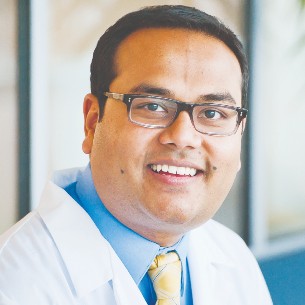 Originally published in "Discussions with Don S. Dizon" on The Oncologist.
Originally published in "Discussions with Don S. Dizon" on The Oncologist.
By Don S. Dizon, MD, FACP, FASCO, and Aditya Bardia, MD, MPH
Maybe it’s because I also lecture on cancer survivorship, and on sexual health after cancer, but I’ve come to realize that I am rarely treating only the one with cancer—I am also treating that patient’s loved ones because I’ve come to understand that cancer is a social disease. It’s part of what makes this profession so special. We not only meet a patient at her most vulnerable, we meet those important to her. And we get to know everyone.
If we are fortunate, these relationships span years, and we get to really understand patients as people—sharing in their joys and celebrations and their sorrows. I’ve seen women with ovarian cancer attend their children’s weddings and meet their first grandchild. I’ve seen young women with breast cancer marry and have families. I’ve treated women born around the same time as me, and I’ve met their kids, who are around the same age as my own. I’ve watched their kids grow, as I and my patients grow gray. I wish it happened often, but sadly, it doesn’t. And to me, it’s hard because when a patient dies, not only does that special relationship cease, so do the relationships that I’ve built with that patient’s circle. I’ve said goodbye to many people after their loved ones have died, and it can almost feel like they’ve walked into another world—one where I no longer fit.
I wondered if this was something others also experienced, and whether my colleagues also found themselves thinking about the families and friends that came in to our lives because of one person’s cancer, and left once that person had died. I decided to talk with Dr. Aditya Bardia about it. Aditya is a friend and colleague I met when I was at Massachusetts General Hospital (MGH). He is also an accomplished clinical researcher who serves as the director of precision medicine at the MGH Center for Breast Cancer. His work focuses on integrating precision diagnostics and therapeutics, including the clinical application of circulating tumor cells and DNA as “liquid biopsy,” to significantly improve the outcomes of men and women treated for, and living with, breast cancer. Recently, his work on the antibody drug conjugate (ADC) sacituzumab govitecan was published in the New England Journal of Medicine. More than this, Aditya is also an incredibly kind clinician—thoughtful, deliberate, and empathic. His dual roles in drug development and early trials and as a busy clinician made him the perfect person to ask about this. He said:
“For me, not seeing a patient’s family or friends after they’ve died is tough. Over the years, I establish a deep bond with the patient and their families. It’s something forged through the times I’ve helped them cope at their most vulnerable, the times we’ve laughed and shared significant life events, and those times when we worked through cancer treatments not working. The patient and caregivers essentially become like a part of an extended family.”
That made sense to me. I remember in my early days as an attending, I had met a young woman with an aggressive breast cancer. She had come in with her family. I got to know all of them pretty well—even learning that the kids were from a prior marriage. For a while we would see each other during 3-month checkups. They barely felt like medical visits because we would just tell stories about our lives and laugh. Then she developed metastatic disease. She restarted treatment and our visits became more somber. Despite our best efforts, her cancer didn’t respond to treatment and she died a few months after her diagnosis. I still remember that her husband came back to see me a week after her funeral. He just needed to talk—he felt like a lifeline had been cut. He explained how the cancer center had been his only other family during that period and that he hadn’t realized how much those visits meant to him. We talked for a while that day, even discussing starting a group for men whose wives had died of cancer. Life got busy and I didn’t hear from him again, but that didn’t mean I stopped thinking about him.
I had felt an obligation to take care of him, but I didn’t know how to. I asked Aditya about it as well. His response:
“I do think we have an obligation as providers—and as extended family members—to support the patient’s family after someone we cared for dies. It’s such a difficult and challenging time. What that means might range from sending a sympathy support card, to making a phone call, to attending the funeral, or even making a personal visit. I have done all of these in one form or another and feel it not only helps the family members but it helps me as well. I think cancer centers can do more, especially since we know that families are as important as the person with cancer. Whether that is through formal programs to support caregivers or after-care programs after a loved one dies, these are needs that should be met. At the end of the day, it is about doing what we can to heal the patient, and that includes their families.”
I agree as well, and we are starting to see those voices in programs. At Lifespan Cancer Institute we have formed Patient and Family Advisory Councils to help steer patient-centered care. Their input will become essential to identifying and meeting the needs of caregivers and spouses throughout the cancer trajectory. We just need to ensure that access continues for caregivers and families, even after the patient has died.


Recent posts